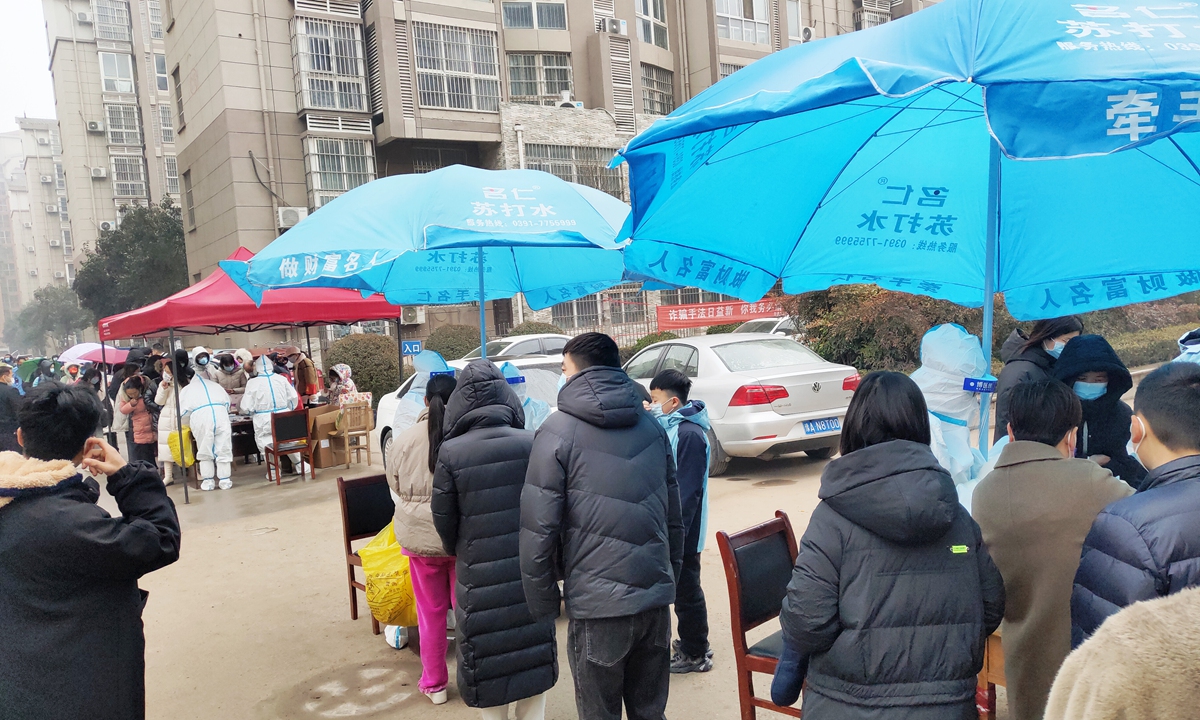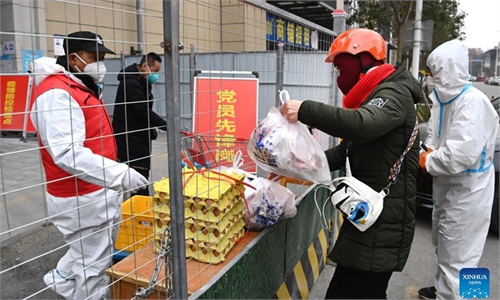
Residents of Anyang, Central China's Henan Province stand in line with their umbrellas in light rain for a second round of nucleic acid testing on January 10, 2022. Photo: VCG
Central China's Henan Province has recorded the most COVID-19 cases among provincial-level administrations nationwide during a single day, and it is also the only province in China that is battling both the Delta and Omicron variants.
On Monday alone, Henan reported 87 domestic confirmed cases, as the Chinese mainland recorded 110. The Omicron variant was found in Anyang while Yuzhou and Zhengzhou are battling the Delta variant.
Anyang, where the outbreak started after two individuals with Omicron variant were discovered - the same transmission chain with that of Tianjin - has reported a total of 84 confirmed cases in this flare-up, all with mild symptoms.
In order to curb the spreading, Anyang, a city of 5 million people, imposed a lockdown on Monday, asking residents not to leave their houses unless necessary, like for nucleic acid tests. Vehicles are banned on the roads and almost all production activities are suspended. Guo Chuan, a resident in Anyang, told the Global Times that residents could still purchase food at certain times. To combat the Omicron variant, the Anyang government dispatched nearly 20,000 officials to engage in anti-epidemic work.
Most confirmed cases in Anyang are students of a local middle school and their parents.
The risks of the Omicron variant's further spread within the city are low, as local authorities said all new cases were detected in epidemic-controlled zones, experts reached by the Global Times said.
The city also suspended selling tickets for trains to Beijing, where the Beijing 2022 Winter Olympic Games will be held a few weeks away.
Yang Zhanqiu, a Wuhan-based virologist, told the Global Times on Tuesday that the existence of both the Delta and Omicron variants won't change anti-epidemic measures much because the variants still belong to COVID-19, but it could drive up infections quickly if there is no proper epidemic management.
For now, the current new cases in Anyang were detected among controlled zones, meaning the epidemic risk is lower.
But for Yuzhou and Zhengzhou, two other Henan cities, which are battling the Delta variant, the sources of infections remain unknown, which makes the epidemic situation complicated, Yang said.
Yuzhou started its seventh city-wide nucleic acid testing on Monday and has imposed a lockdown since Sunday. The commerce administration of Yuzhou vowed to guarantee the safety of people's lives during the lockdown. Zhengzhou, the provincial capital, has put strict measures on communities and areas where confirmed cases were found. Fewer vehicles are allowed on the roads and subways have been ordered to run at a 50 percent capacity. Apart from places providing daily necessities, other venues are closed.
From January 4 to 10, Zhengzhou conducted four rounds of mass testing and five rounds of tests among key groups. The current new cases were all from epidemic controlled zones. As of Monday, Zhengzhou has reported 106 confirmed cases in this outbreak.
To curb the virus' spread, China's Ministry of Transport urged cutting off public transportation to and from the epidemic risk regions.
Henan has asked its residents to avoid travelling during the upcoming Spring Festival.
Meanwhile, Xi'an in Northwest China's Shaanxi Province, the metropolis hit hardest since the Wuhan outbreak, is rolling out policies to relax restrictive measures accordingly since Monday, as the number of cases in Xi'an has been going down.



